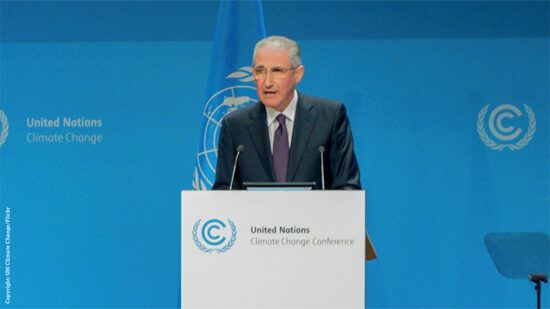The UK Treasury Select Committee has joined calls for the government to publish its Net Zero Strategy “as soon as possible” and has pushed for clear timetables, economic costs and what roles different parts of the government will play, as vital inclusions of the plans.
Yesterday, on Earth Day, investment industry commentators highlighted while there have been many long-term commitments to reach net zero carbon emissions by 2050, little has been done in terms of action taken, leading to calls for company management and governments to step up and take immediate steps.
The Treasury Committee report, Net Zero and the Future of Green Finance, also published yesterday, echoed these calls and said while the government has made “bold claims that the economic recovery [from Covid-19 impact] will be a green recovery”, it has not, except in limited circumstances, “imposed green conditionality on the support it has provided during the coronavirus pandemic”.
“The chancellor should publish the Net Zero Strategy as soon as possible and should set out, in conjunction with the Net Zero Review final report, the principles upon which the UK will fund its transition to net zero carbon emissions by 2050,” the Treasury report said.
See also: – Earth Day: The gap between ambition and action can quickly be bridged
It added the government needs to set out in its Net Zero Strategy final report who at ministerial level will be responsible for delivering net zero, the roles of different departments, and how it will ensure the “UK remains on track to meet its net zero target in a cost-effective way”.
It also requested the government set out what mechanisms it will put in place to integrate the net-zero target within departments’ spending review commitments, and how departments will be held to account should they fail to meet their targets. It also wants to see the cost estimates associated with achieving net zero by 2050 including the cost methodology, a range of scenarios on how net zero might be achieved, and the associated cost for each scenario.
“The Net Zero Review final report should include clear sectoral pathways towards decarbonisation and should address the key policy decisions as to the future of high carbon industries. Particular attention should be given to the potential regional impact of those decisions, and the government should set out a framework and strategy for supporting those communities which will be most impacted by these changes. This is especially important given the government’s commitment to a Just Transition as part of the Paris Agreement,” it added.
Defined contribution pension fund choice
The report also said there is a “high level of inertia among consumers” around defined contribution pension fund choice, with most remaining in the ‘default’ fund.
“The Treasury has been robust in its view that default funds should not be required to move to more green alternatives, but at the same time maintains that consumers should not have to switch out of the default fund to invest sustainably. The government should resolve this apparent contradiction.”
It added the Treasury is currently relying on a blend of disclosure, regulation and public investment to foster a transition towards more sustainable investment.
“For now, we support that approach, but the Treasury should report regularly on the proportion of pension holders in defined contribution pension schemes who remain in the default fund, and the extent to which those default funds are aligned with a path to net zero.”
It also called on The Pensions Regulator to consider defined benefit schemes, which are not currently required to acknowledge ESG concerns but instead rely on trustees for how assets are allocated, and also consider how to reach smaller pension schemes and how they will be encouraged to integrate climate governance and reporting requirements.
The Treasury also said it should work with the Financial Conduct Authority on how to mitigate greenwashing and how to best make labels of financial products clear and widely understood.
“A taxonomy is an important part of identifying what can be considered green investment, so the announcement of a UK taxonomy is welcome. The Treasury and regulators should work at speed to ensure that there is a clear timetable and legislative pathway to deliver a UK taxonomy ahead of COP26 in November 2021. The UK can utilise the EU’s taxonomy but can exceed it when it will assist the UK’s goals. The UK should seize the opportunity presented by COP26 to use its own work on a taxonomy to push for greater international convergence.”
It also welcomed the launch of green gilts and move to mandatory climate-related financial disclosures but added: “The process will be run to different timetables for different firms, across different regulators according to the Roadmap published by the Joint Government Regulator TCFD Taskforce. The Treasury, via the Taskforce, will need to play a key role in ensuring that pressure is maintained for a consistent and rapid implementation of these disclosures.”
Reacting to the Treasury report, Joe Dabrowski, deputy director of policy at the PLSA, said: “There is a universal consensus among pension schemes about the importance of investing in a climate-aware way, with a wide range of activity happening across the sector. However, there are barriers that inhibit schemes – and in the course of our extensive engagement with pension schemes for our A Changing Climate report there was a consistent message that lack of common metrics and a common Taxonomy was a big issue.
“We were therefore extremely pleased that the government has committed to addressing this important issue in its TCFD Roadmap, published in November. The report from the Treasury Select Committee, which matches our recommendation that the UK should seek to establish a clear timetable and legislative pathway to deliver a UK taxonomy ahead of COP26 in November 2021, is hugely welcome. We look forward to working with the government on this to ensure it happens.”
Yesterday, it was announced by the European Commission tougher climate laws are being rolled out across the EU as legislators agreed on the European Climate Law, part of the European Green Deal, which will see larger commitments to net-zero goals.








